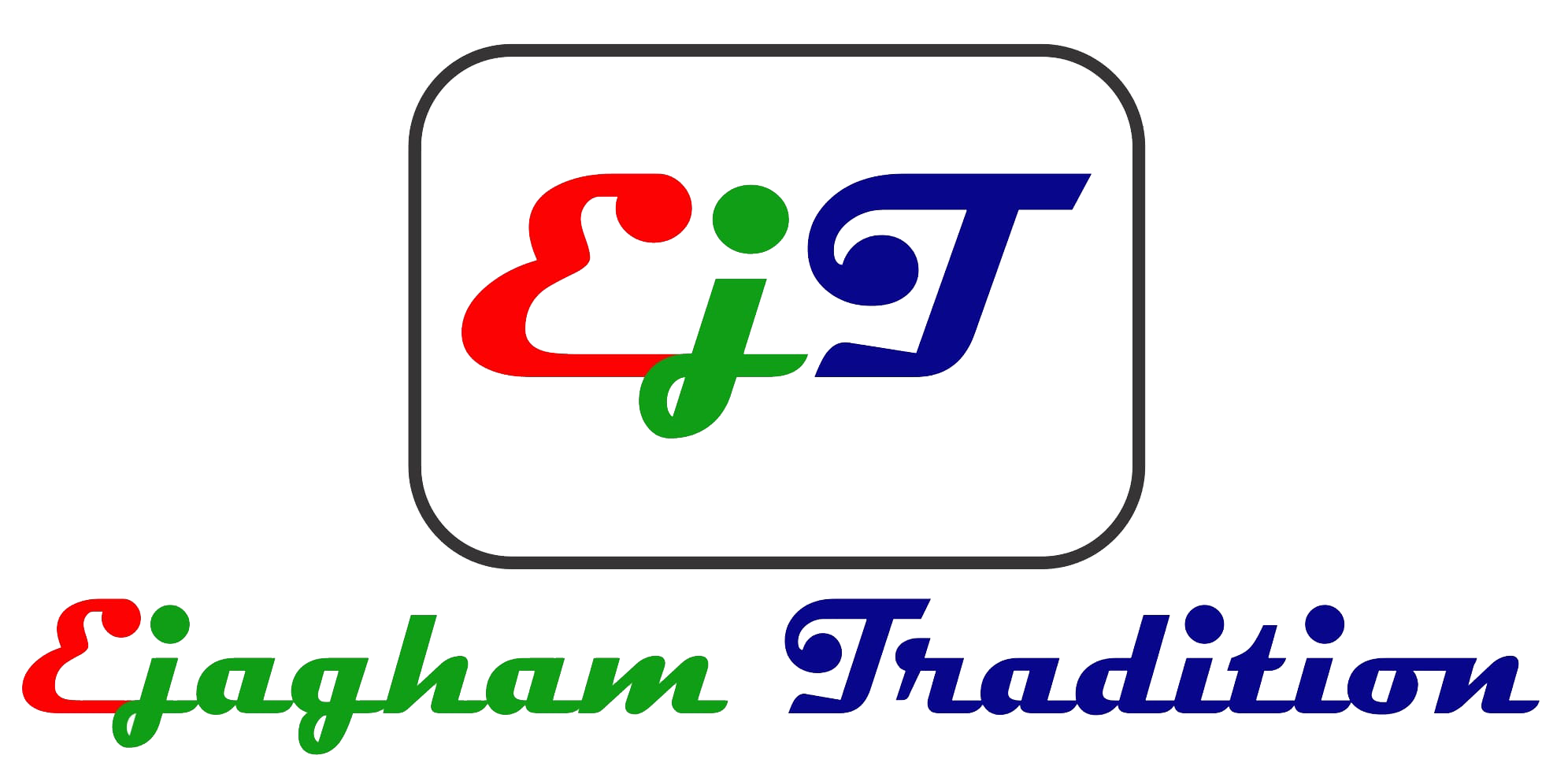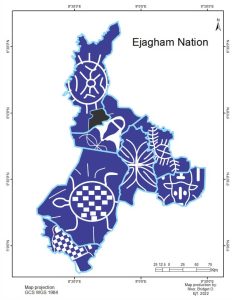Ejagham Tradition Custodians
Traditionally, the socio-economic manifestation of Ejagham people typically exist in the form of villages. Each village (Mfam or Etek) is autonomous and they relate with each other on that basis. The administration of the villages is in conformance with Ejagham culture, customs and tradition, all of which constitute Ejagham heritage.
Ejagham heritage is proudly owned by all Ejagham people. It is made manifest through the institutions that form its foundation. The culture, customs and tradition of Ejagham people is protected and safeguarded by the leadership of these institutions. These leaders are Ejagham tradition custodians.
Natural Rulers
A typical Ejagham village is administered by a group of Ejagham tradition custodians which include but may not be limited to the following.
- Ntufam
- Iyamba
- Ntui Emang
- Ntui Okwa
- Ntunkae Ekpa
- Ntui Ekan
The above represents the core traditional leadership structure of the custodians of Ejagham heritage across Ejagham nation. It would not be unusual to detect slight variations in the designations of the core leadership structure from one cluster to another. However, the substance remains the same. This core structure constitute what is referred to as the Natural Rulers. They are referred to as such because normally the lineage of each individual in these positions could be traced to land in which the rule. The context of Natural Rulers is important especially as it provides clarity to subsequent acknowledgment of the influence of 21st century phenomena to Ejagham core traditional leadership structure.
It is important to mention that at all times, there is only one person in the village occupying positions 1 to 5 mentioned above. Position 6 usually have multiple holders depending on the number of age grades that have come of age in that community (Mbing Ekan). In all cases, the positions are usually maintained for the life of the individual. There may be unique situations where Ntufam may double as Ntui Emang or Ntui Okwa.
Like most other aspects of life endeavour, modernization, urbanization, migration, technology, geo-political delineation etc. have influenced the structure of Ejagham tradition custodians. In spite of these influences, the core structure is still prevalent to a large extent in Ejagham communities.
Ntufam
Ntufam is a combination of two Ejagham words Ntui (Chief) and Mfam (Village/Town). Ntufam is the ruler of the village and he is assisted by other Atui (Chiefs) of the village or town.
Since Mgbe is the highest institution of collective local authority in Ejagham, most Atuiofam (plural of Ntufam) also attain high ranking status in Mgbe institution.
To date, each Ejagham village is ruled by Ntufam.
Iyamba
Iyamba is the head of the Mgbe institution in Ejagham. Mgbe is the supreme governance system in Ejagham. Hence, while Ntufam is the ruler of the village, Iyamba is essentially the Prim Minister of the village. Iyamba is the “owner” of Ocham, the Mgbe Lodge[.
Ntui Emang
Ntui Emang is the High Priest of the village. He is regarded as half spirit and half man in the traditional sense, an intermediary between the gods and men who wields absolute authority.
The ancient process of his enthronement involved very rigorous rituals and sacrifices. Because of his enormous authority, he was well tamed (prior to enthronement) to control his powers and temperament. Thus, for a period of time in a year he squats somewhere all-day everyday. You can spit on him and insult him as you like and he would never react (this is practiced in Akparabong). But on completion of this period you hardly look into his face directly again. You had to bend downwards or crouch to greet him because he then had the power of death and life in his hands. At his death his burial, just like his enthronement, was graced by special rituals.
Ntui Okwa
Okwa is simply a Court. Ntui-Okwa is akin to a Chief Judge in today’s setting. Thus, he judges cases involving everybody in the village including women, children and strangers. This position was unlike Emang whose affairs and dealings never directly involved women.
Ntunkae Ekpa
Ntunkae Ekpa is Chief of Ekpa institution. Ekpa institution is the most dominant Ejagham women socio-cultural institution which also doubles as a judiciary system for the enforcement of norms and punitive mechanism for women.
Ntui Ekan
Ekan mean age grade and Ntui Ekan is Chief of a particular age grade. Ekan is an age old Ejagham traditional institution. An Ejagham age grade is typically made up of three ages. For instance, people born in year 2000, 2001 and 2003 would make up one age grade.
In most Ejagham communities, age grades that have come of age are recognized by naming them in a tradition naming ceremony called Mbing Ekan. This day is usually a significant day for the age grade and the community.
The age grade, amongst of things, supports the community for the execution of directives of both the Ntufam and Atui, the elders Council.
Influence of 21st Century Phenomena.
The phenomena of the 21st century that has impacted the globe include, but are not limited to, Modernization, Urbanization, Migration, Technology and Geo-political delineation. Ejagham heritage was not spared.
The influence of 21st century phenomena has resulted in changes to Ejagham heritage (as with other heritage) that are intended to match contemporary times. These changes could be said to enhance Ejagham traditional leadership. Fortunately, it has not fundamentally changed the core structure.
Influence of 21st Century Phenomena – Ejagham Nigeria
In Nigeria, the obvious changes to our traditional leadership structure are the introduction of Paramount Ruler and the Clan Head. Both are political creations. There is also a third dimension which is the creation of honorary chieftaincy title
Paramount Ruler
Nigeria operates a three tier system of government, Federal, State and Local government Area. The modality in which traditional Rulers are engaged in political governance is by appointing a Paramount Ruler for each Local Government Area. Hence we now have Paramount Rulers.
Some Local Government Areas are not mono ethnic hence in some cases the Paramount Ruler may not be of Ejagham heritage.
Clan Head
Each local government consist of clans and clans, villages. Hence we now have Clan Heads. We have always had Village Head, the Ntufam.
The unique situation of the Paramount Ruler and Clan Head being political appointments also means that they could be removed at any time. On the contrary, a member of the core Ejagham Tradition Custodians serves for life. It is reasonable to opine at this point that as long as the Paramount Ruler and the Clan Head retain their appointments, they remain part of Ejagham tradition custodians, alongside the Natural Rulers.
It is noteworthy to mention that, all things being equal, the Paramount Ruler and Clan Head are usually products of the Natural Rulers which further supports the argument for them being part of Ejagham tradition custodians.
Influence of 21st Century Phenomena – Ejagham Cameroon
In Ejagham Cameroon, similar changes apply. The nomenclature of the chieftaincy titles varies slightly but essentially structurally similar. In Ejagham Cameroon, it is understood that the core structure still applies with Ntufam at the helm of affairs. However, in the South West of Cameroon, there is a south West Chiefs’ Association and Chiefs are officially classified into three groups – First Class, Second Class and Third Class Chiefs. First class Chiefs must rule villages or groups of villages with a population of ten thousand people upwards. Villages with populations between four thousand people but less than ten thousand have second class chiefs. The rest are third class chiefs.
Influence of 21st Century Phenomena – Honorary Chieftaincy Title.
The conferment of honorary chieftaincy title to an individuals is foreign to Ejagham and a direct influence of the 21st century phenomena. It appears it has come to stay hence the need to clarify the reason, context and implications and or consequences.
The context of conferment of chieftaincy title is very important. The whole context of chieftaincy title is traditional. If someone does not like tradition, the person should reject the conferment of such title as soon as it is mentioned.
In Ejagham, Chieftaincy is Otui, a derivative of Ntui. Ntui is Chief and there could be many chiefs in a village. The attainment of status of Ntui may vary but are crystal clear. However, only one Ntui becomes the leader of all the Atui. This leader in Ejagham is the Village Head named Ntufam.
It happens that not only has Ejagham adopted conferment of chieftaincy title, the prefix that has been chosen for the title is Ntufam, although they rule over nobody. This is what applies in Ejagham Nigeria, Ejagham Cameroon equivalence is yet to be established.
As stated earlier, the whole chieftaincy conferment is tradition based and always executed by the Natural Rulers. The conferment exercise is significant for many reasons.
One of the reasons of its significance is that – it is an extension of Scepter of Authority (in the area of conferment) preserved for the Natural Ruler, to the recipient. The recipient is obliged to perform the responsibilities associated with the area of conferment on behalf of the Natural Rulers. This is very significant. It is hoped that it is now obvious why implications and consequence were mentioned earlier. If the recipient fails at his or her obligations, the Natural Rulers wasted their resources in conferring the honorary title to the recipient.
The point of this is that, the 21st century phenomena has created a formally non existent arm of Ejagham tradition custodians, the honorary Chiefs. In EjT we refer to them collectively as Atem-Atui.

